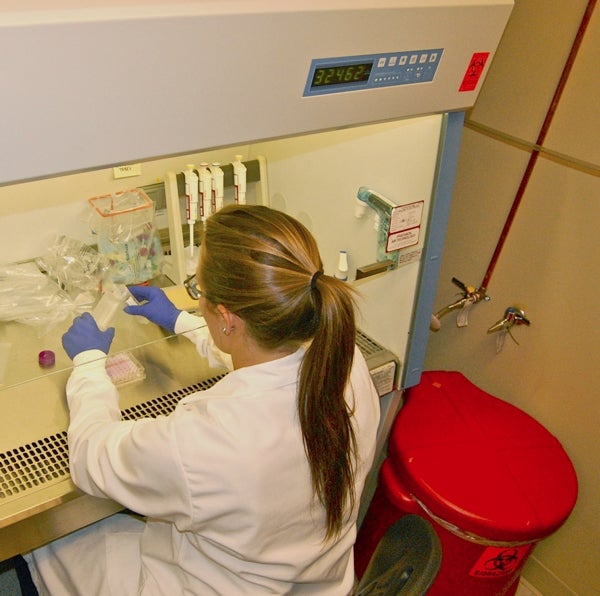Interns spend summer researching health benefits of fruits and vegetables
Published 12:00 am Thursday, July 16, 2015

- Holli Chandler spends much of her internship in the lab. Jeanie Groh/Salisbury Post
KANNAPOLIS — It’s a well-known fact that fruits and vegetables are both delicious and healthy, but few people truly understand exactly how they can impact the body. Thirty interns with the Plant Pathways Elucidation Project, called P2EP, however, are studying just how to harness those benefits and use them to benefit human health this summer.
Led by a team of N.C. State University faculty and doctoral students, 30 undergraduate interns spend 11 weeks researching fruits, vegetables and oats at the North Carolina Research Campus with the Plants for Human Health Institute.
During the multifaceted internship, interns spend time in the lab studying cells and conducting experiments, in the field collecting samples for experiments, at the computer analyzing data and in the community sharing their findings and how to apply them.
Last week, a group of interns led a cooking demonstration for community members at the Cabarrus Health Alliance, where they taught a group how to make Plum-Berry Salsa.
As they prepared the simple dish, they explained how each ingredient positively impacts human health. The ingredients are all what they call “functional foods,” or foods enriched with health-promoting or disease-preventing qualities.
For example, they shared that blackberries are rich in compounds that their research has shown contains anti-inflammatory properties. These anti-inflammatory properties can help with obesity, cardiovascular disease, neurodegenerative disease and diabetes. Cinnamon, on the other hand, contains a compound that could improve type 2 diabetes conditions by lowering fasting blood glucose levels.
As an athlete, Catawba College senior Johnathan Boles said he’s interested in nutrition.
“You get out what you put in,” he said.
When one of his professors suggested that he look into the internship, he was intrigued.
“I want to go through family medicine,” Boles said, adding that his goal is to impact people’s lives through their health.
His team is specifically researching how different lines of oats impact skin cells and wound healing.
When the interns come into work each day, they check their cells in the lab to make sure they’re growing, then they conduct various treatments and experiments.
“We keep the cells growing,” Boles said, adding that they check after the treatments to see if they “actually help.”
Holli Chandler, also a senior at Catawba, is working on a similar project.
Her group is using different types of broccoli extract to combat human colon cancer cells.
Chandler said their research could be used to “make sure we’re consuming the right types of broccoli.”
Raymond Wiggins, a senior biology major at Livingstone College, is working on the other side of the scientific research.
Using the findings of those students in the lab, Wiggins and his team spend their days using complex computer programs to look at and compare blueberry, broccoli and oat genes.
Second-time intern Brooklyn Phillips has a bachelor’s degree in biology/pre-med from Western Carolina University and just completed her associate’s degree in biotechnology at Rowan-Cabarrus Community College.
Phillips said the internship has given her “hands-on experience” and networking and collaboration opportunities.
“I wanted to come back to elevate my skills,” she said.
Although this is her second year interning with P2EP, Phillips said she’s learning new things this year. Last summer, she focused her research efforts on DNA, and this year she’s studying RNA.
The interns don’t just stick to their own work, though. They also conduct frequent literature reviews, where they learn about things other scientists are finding.
“In science, that’s really critical,” Chandler said.
“Why reinvent the wheel,” she added.
The interns also present their own research to each other each week during Five Minute Madness sessions. Their summer at the Research Campus will culminate with a July 29 symposium where they will share their findings. These events allow the interns to develop their public speaking and presentation skills.
Chandler said the work they’re doing is important. Learning how different plants can impact on health and informing the public can help them make simple decisions that make a big difference in their health.
“The things in the kitchen – those are things you can control,” she said.


